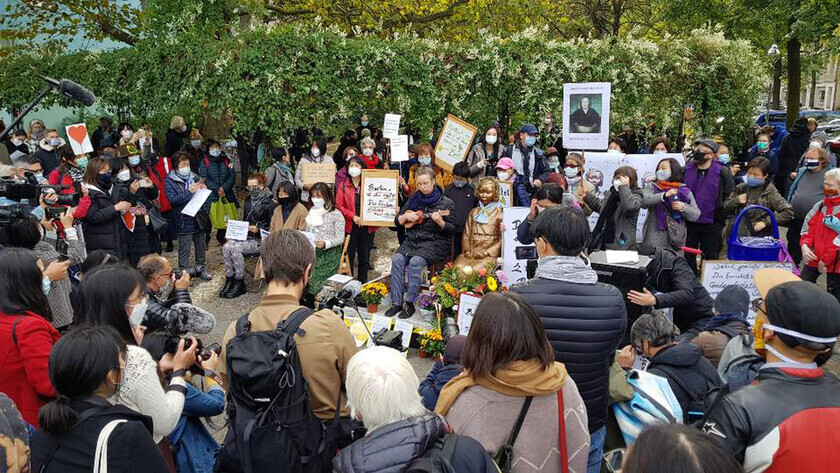hankyoreh
Links to other country sites 다른 나라 사이트 링크
Japan’s LDP send statement to Berlin demanding removal of comfort woman statue

Lawmakers from Japan’s Liberal Democratic Party (LDP) have reportedly sent a statement to the city of Berlin pressuring authorities there to remove a statue of a young girl representing victims of wartime sexual slavery. The South Korean Ministry of Foreign Affairs (MOFA) responded by calling the move “unhelpful in resolving issues related to Japanese military comfort women survivors.”
According to the Nov. 21 edition of the Sankei Shimbun newspaper, 82 lawmakers from Japan’s ruling LDP sent a statement to the mayor of Berlin’s Mitte borough and the borough council on Nov. 18 demanding the statue’s removal. Spearheaded by lawmakers including former Defense Minister Tomomi Inada and Rep. Shuichi Takatori, the statement argued that the statue was “neither a work of art nor a representation of victims of wartime sexual violence in general, but targets only Japan and unilaterally damages Japan’s dignity.” It also warned that it might “give the impression that Mitte borough expressed its unilateral political support, and negatively impact friendly relations between Japan and Germany.”
In connection with this, a MOFA official said on Nov. 22 that the South Korean government “is of the position that with regard to comfort women statues in third-party countries, interference in the form of removing a work of art voluntarily erected by civilians for purposes of remembrance and education in connection with clear historical facts is not only unhelpful in resolving issues related to Japanese military comfort women survivors, but also contrary to the spirit of perceiving responsibility and remorsefulness that Japan itself has voiced.” The position is the same one the city of Seoul has repeatedly shared on this issue.
The statue in central Berlin was erected in late September after permission was granted by the borough government in July. Amid continued pressure from the Japanese government for its removal — with Foreign Minister Toshimitsu Motegi personally joining the fray — the borough issued an order for the statue’s removal on Oct. 7, just nine days after it was raised. The civic group Korea Verband has filed with the Berlin Administrative Court to have the removal order suspended; in the meantime, Mitte is holding off on removing the statue as it awaits the court’s decision. With the latest statement, members of the Diet of Japan appear to be throwing their weight en masse behind the push for the statue’s removal.
During November, South Korean officials such as National Intelligence Service (NIS) Director Park Jie-won and Korea-Japan Parliamentarians’ Union Chairman Kim Jin-pyo have taken turns meeting with Japanese Prime Minister Yoshihide Suga in an effort to improve relations between Seoul and Tokyo. They seem to be trying to stage the Summer Olympics in Tokyo next July as a means of resuming cooperation at a time when the two sides have been unable to bridge their differences on the matter of compensation for survivors of forced labor. But what has become clear in the process is that Japan is still insisting on measures from Seoul to neutralize a Supreme Court ruling ordering compensation for forced labor as a precondition for improving relations.
In a meeting with reporters on Nov. 20, the Japanese Embassy in South Korea announced that the Japanese government would soon be making a decision on the ocean release of radioactively contaminated water from the Fukushima Daiichi Nuclear Power Plant. While it stated plans to agree to information disclosure and a joint examination of the environmental impact if requested to do so by the South Korean government, it also reaffirmed that the decision to release the water itself is not open to discussion. South Korea-Japan relations appear poised to enter the winter as strained as ever.
By Kim Ji-eun, staff reporter
Please direct comments or questions to [english@hani.co.kr]

Editorial・opinion
![[Column] Season 2 of special prosecutor probe may be coming to Korea soon [Column] Season 2 of special prosecutor probe may be coming to Korea soon](https://flexible.img.hani.co.kr/flexible/normal/500/300/imgdb/original/2024/0426/3317141030699447.jpg) [Column] Season 2 of special prosecutor probe may be coming to Korea soon
[Column] Season 2 of special prosecutor probe may be coming to Korea soon![[Column] Park Geun-hye déjà vu in Yoon Suk-yeol [Column] Park Geun-hye déjà vu in Yoon Suk-yeol](https://flexible.img.hani.co.kr/flexible/normal/500/300/imgdb/original/2024/0424/651713945113788.jpg) [Column] Park Geun-hye déjà vu in Yoon Suk-yeol
[Column] Park Geun-hye déjà vu in Yoon Suk-yeol- [Editorial] New weight of N. Korea’s nuclear threats makes dialogue all the more urgent
- [Guest essay] The real reason Korea’s new right wants to dub Rhee a founding father
- [Column] ‘Choson’: Is it time we start referring to N. Korea in its own terms?
- [Editorial] Japan’s rewriting of history with Korea has gone too far
- [Column] The president’s questionable capacity for dialogue
- [Column] Are chaebol firms just pizza pies for families to divvy up as they please?
- [Column] Has Korea, too, crossed the Rubicon on China?
- [Correspondent’s column] In Japan’s alliance with US, echoes of its past alliances with UK
Most viewed articles
- 1AI is catching up with humans at a ‘shocking’ rate
- 2[Column] Season 2 of special prosecutor probe may be coming to Korea soon
- 3Is Japan about to snatch control of Line messenger from Korea’s Naver?
- 4‘We must say no’: Seoul defense chief on Korean, USFK involvement in hypothetical Taiwan crisis
- 5Up-and-coming Indonesian group StarBe spills what it learned during K-pop training in Seoul
- 6The dream K-drama boyfriend stealing hearts and screens in Japan
- 7[Column] ‘Choson’: Is it time we start referring to N. Korea in its own terms?
- 8Amnesty notes ‘erosion’ of freedom of expression in Korea in annual human rights report
- 9Is N. Korea threatening to test nukes in response to possible new US-led sanctions body?
- 10Division commander ordered troops to enter raging flood waters before Marine died, survivor says